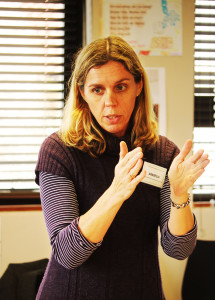 I have mixed feelings about September. While in my head it heralds the beginning of spring and the move towards warmer weather (even if nature doesn’t actually play along with this), International Literacy Day on 8 September always provides a sobering reality check: 775 million adults in the world who are illiterate; 64% of these women and 22% living in sub-Saharan Africa. Not exactly uplifting stats!
I have mixed feelings about September. While in my head it heralds the beginning of spring and the move towards warmer weather (even if nature doesn’t actually play along with this), International Literacy Day on 8 September always provides a sobering reality check: 775 million adults in the world who are illiterate; 64% of these women and 22% living in sub-Saharan Africa. Not exactly uplifting stats!
While most people appreciate the link between literacy and development and democracy, we seem collectively unable to dream up bold, innovative, sustained and sustainable strategies that will have a real impact on literacy figures – strategies that will significantly increase the number of people in South Africa who enjoy reading and use it in some form every day to shape their lives in positive ways. Traditionally, we have always looked to schools to get children reading and so address challenges like the low literacy levels of school children and illiteracy in society. But it is exactly this line of thinking that limits the possibility of us being a nation of readers.
Schools, I suspect, see themselves as places in which reading instruction happens, so on the literacy front their focus is on fulfilling the demands of an ever-changing curriculum, teaching children to read using specially created ‘reading schemes’ and then testing their reading abilities. Of course it is the business of schools to teach children to read but here’s the catch: we will not create a reading nation by this alone.
It is widely recognised that the more children read, the better they get at it. But what child is likely to want to read if all they ever encounter are textbooks and ‘readers’ – books specifically designed for teaching reading that have controlled vocabulary and language use so that, the theory goes, children can move from the ‘simple’ to the more complex. The problem is that ‘simple’ readers are often the most difficult for children to read because they do not mirror the ways in which we use language in everyday life and so children can’t use what they have already learnt about language to decipher a text. (I mean, who ever says, “Look, Jane, look. I see a dog” when they are drawing a friend’s attention to a dog!) In addition to this, most readers barely have storylines so they are not going to inspire children to want to read more!
In countries where there is wide access to well-crafted ‘real’ books that contain rich and inviting stories, having to read ‘empty’ texts at school is just a waste of everyone’s time and money. But, in South Africa, where the majority of our children only ever encounter books at school, this must have a significant impact on our ability to ‘grow’ lifelong readers – adults who choose reading as a recreational activity.
If we are serious about addressing illiteracy, we have to find ways to connect children with books that allow them to experience for themselves the thrill of stories that nurture, inspire, make you laugh or cry, and expand your world. Teachers need to be reading picture books and novels to children in their classrooms simply because it is satisfying to do so. Children need to be cuddling up regularly with someone at home to share a book. Where they exist, our libraries, bookshops and reading clubs need to offer opportunities for children to enjoy books together with other children and adults simply because it feels good to do so. This is how we develop the association of reading with pleasure – an essential ingredient to getting children hooked on books. And we need to think more broadly too about where we get all the inspiring texts and stories we need! Stories don’t only have to be published in printed books. They can also be delivered in newspapers and magazines, and on cellphones and tablets. This is not about ‘either-or’ – we need ‘both-and’.
Changing literacy statistics is about social change and this takes time but by next spring surely we all could have at least read a few inspirational books to a few children and so started the change on its way?
Arabella Koopman is responsible for the development and management of materials for Nal’ibali. Before joining the publishing industry, she worked as a teacher and teacher-educator. More recently she has worked as a writer and publisher, and in publishing management. She has a special interest in developing and researching materials that support and extend children’s literacy in multilingual settings.
We want to hear what you think our children need if we want all of them to become fully literate citizens. Submit your ideas for our Charter of Children's Literacy Rights, or email them to letters@nalibali.org.
This article originally appeared in City Press (8th September).
